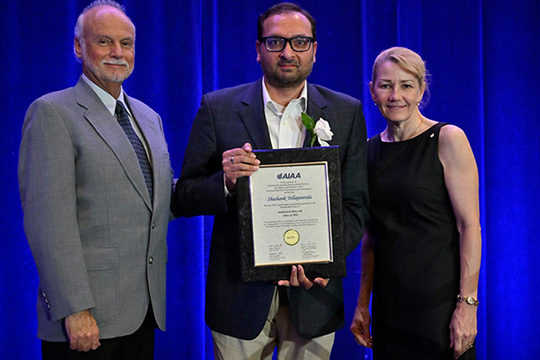Shashank Yellapantula Receives American Institute of Aeronautics and Astronautics Fellow Designation

Shashank Yellapantula accepts American Institute of Aeronautics and Astronautics (AIAA) Associate Fellow recognition for his contributions at NREL. Photo from AIAA
Shashank Yellapantula, senior staff scientist in the High-Performance Algorithms and Complex Fluids (HPACF) group in the National Renewable Energy Laboratory's (NREL's) Computational Science Center, was recognized as a 2024 American Institute of Aeronautics and Astronautics (AIAA) Associate Fellow. The recognition is for contributions to the arts, sciences, or technology of aeronautics or astronautics.
Before coming to NREL in 2017, Yellapantula led research teams in developing production simulation tools for gas turbine combustion engines with the General Electric Global Research Center. At NREL, he leads projects spread across areas involving combustion, sustainable aviation fuels, and wind and solar energy. He has advised multiple postdoctoral scholars at NREL and has over 30 scientific publications and three patents.
Yellapantula's research takes aim at solving technology challenges impacting the renewable energy industry. Whether it is measuring how certain atmospheric flow phenomenon impact wind plant performance or what factors to consider in new aircraft engine design compatible with newer sustainable aviation fuels, he works with industrial partners to determine how research can help them. "Whatever research we do, someone has to make, inform, or improve a product, and we try to make sure our research is relevant, important, and useful," he said.
His work is highly collaborative by design, and he always looks through that lens to consider how research can aid industry in improving a product or a technology.
"Shashank creates new funding and research opportunities for the group while delivering impressively on existing projects. He has brought in new research areas for staff within HPACF and across the lab," said Marc Day, NREL's group manager for the HPACF. "Shashank is building a detailed long-term vision to develop new programs in several areas in solar and energy storage and has proven to be extremely effective at utilizing his expanding range of contacts across the lab, universities, and industry to energize, validate, and kickstart his new initiatives."
Yellapantula is "grateful for the opportunities" he has received that have brought him to where he is—"the right place at the right time," he said.
A long way from simulating bird flocking in graduate school, Yellapantula's research involves simulating conditions to improve sustainable energy technologies. He researched the impact of low-level jets on wind farm arrays along the U.S. North Atlantic coastline using large-scale, high-fidelity simulations. He is working on quantifying wind-driven loads on concentrated solar power collector structures. Despite not having direct experience in leading a large measurement campaign with remote deployment, Yellapantula effectively led the project's simulation and measurement components, showcasing his adaptability and strong leadership skills. He is currently leading a project de-risking the approval process for 100% drop-in sustainable aviation fuels. He has received numerous honors for his work, served on technical review panels in various capacities, and currently mentors NREL staff and postdoctoral students.
Day said that Yellapantula is always looking to expand the work of HPACF. "In addition to staffing and directing research across several different programs, Shashank works continuously to develop new, larger, and broader ideas for how simulation, modeling, and experiment can advance many of the applications in NREL's space, with a mantra of pushing our contributions well past tool development and application to thought leadership."
Yellapantula sees the AIAA fellowship as an opportunity to highlight sustainability—and the work NREL is doing—in aviation.
"The aviation industry has to look at sustainability seriously and start to implement solutions that go towards carbon-negative aviation, and the research community needs to provide those solutions to the industry so that they can adopt them," he said. "I want to use this platform to spread more awareness and to bring the aviation industry and research communities together."
Read more about Yellapantula's research interests in his bio, and learn more about advanced computing at NREL.
Last Updated May 28, 2025
